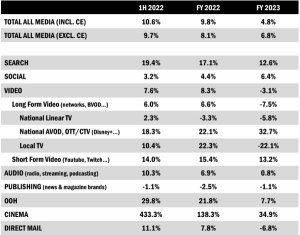The brilliant fiction writer and essayist David Foster Wallace famously hated marketing for being manipulative and causing “despair” in society. He probably would have found the title above disturbing.
But as a fan of DFW, I’m betting he’d be okay with Mad Mimi’s email marketing vibe because so much of what Mad Mimi users publish is honest and useful.
Maybe he’d even offer a few tips on how to do better email marketing. Okay, that’s a stretch, but just for fun, let’s look to some of his quotes for inspiration.
1. “The average person you’re writing for is an acute, sensitive, attentive, sophisticated reader who will appreciate adroitness, precision, economy, and clarity.”
This advice was for writing students but works for content marketers. Your readers are sophisticated but impatient. Your writing should be clear and simple, but not simplistic. Avoid clichéd writing, but also clichéd thinking. Remove unnecessary words. While you’re at it, remove unnecessary thoughts. Only interesting verbiage and novel ideas should remain.
Try this: after you write your email, but BEFORE you publish it, search the web for similar items. Doing so gives you a sense of whether, and to what degree, your message is an industry trope. Some repetition is okay because good ideas bear repeating. But it may only take a subtle change to make your perspective unique, thereby justifying your newsletter’s existence to an attentive, sophisticated audience, which, according to Wallace, is everybody.
2. “Writing, I felt like I was using 97 percent of me, whereas philosophy was using 50 percent.”
Wallace switched from philosophy to writing because it allowed him to combine logic, creativity, heart and soul. Similarly, compared to traditional advertising, email marketing uses a bigger percentage of your being. You’re free to write on topics that force you to think and feel, tell stories that yield gritty, jagged-edged, hard-won advice, or come up with iconoclastic angles on conventional wisdom.
Try this: write a scathing private journal entry about your industry, your career, your product or service. Set it aside, let it cool for a day. Come back to it and see if you can salvage some of its raw truth while adding a positive angle. It might only take a small adjustment to make it publishable in your newsletter, without losing the energy and candor that make it unique.
Email marketing can be your license to give readers what Wallace called “the capital-T Truth.” That’s all they want. If you don’t give it to them, your competitors will.
3. “There are so many different well-formed ways to say the same basic thing, from e.g. ‘I was attacked by a bear!’ to ‘Goddamn bear tried to kill me!’ to ‘That ursine juggernaut did essay to sup upon my person!’ and so on.”
The tone of voice says a lot about you. Your email marketing tone should convey integrity, reliability and authority, but also friendliness, approachability, and empathy.
There are different ways to do this depending on your market, but there’s a danger of overthinking it. You could lose weeks meditating on brand voice when in reality it almost always comes down to this: be conversational, concise and upbeat.
Try this: say your ideas into a recorder as if you’re talking to your best friend. Listen back and write the words down. You’ll have a simple framework of ideas with a natural tone. Use this as your rough draft and start editing.
4. “What goes on inside is just too fast and huge and all interconnected for words to do more than barely sketch the outlines of at most one tiny little part of it at any given instant.” (Narrator, “Good Old Neon”)
When industry experts have great ideas but aren’t great writers, the result is often complicated content nobody wants to read. Conversely, when writing services or freelance crowd sites pump out newsletters on topics they know nothing about, the result is generic filler.
Both kinds routinely invade inboxes for the purpose of moving the needle and gaining visibility. But if that’s the only reason you’re sending emails, results will be subpar. Wallace says it best.
5. “One paradox of professional writing is that books written solely for money and/or acclaim will almost never be good enough to garner either.”
This notion is true for email marketing. To win results, you need to care about what you’re saying, make sure it’s useful and take the time to say it well.
Easier said than done. Sometimes it helps to divide the task of writing between two people — an idea person to create a rough draft of fresh, relevant insights and advice, and a master revisor to make it magnetically readable and appealing.
Working together in this way, perhaps we can create email marketing David Foster Wallace wouldn’t hate. More importantly, perhaps we can write emails that your subscribers look forward to opening.
Digital & Social Articles on Business 2 Community(57)



